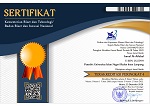BUILDING A HAPPY HOUSEHOLD: A MODEL OF HUSBAND AND WIFE RELATIONSHIP AND ITS IMPLEMENTATION IN THE FAMILY LIFE OF TABLIGH CONGREGATION.
Abstract
This study aims to analyze the relationship model of married couples in Tabligh Jama'ah in Bandar Lampung City and Metro City. And to explore the actualization of the rights and obligations of married couples in maintaining family harmony in the tabligh congregation of Bandar Lampung City and Metro City. This field research intensively examines how the husband and wife relationship model in the family of tabligh congregation in Bandar Lampung City and Metro City. Data were collected using observation, interview, and documentation methods. The research informants consisted of six families. The data analysis technique used in this research is qualitative data analysis. Based on the results of the study, it was found that the husband and wife relationship model in tabligh congregation in Bandar Lampung City and Metro City is that the husband in the tabligh congregation family is absolutely the leader of the household, and this is also by Marriage Law No.1 of 1974 article 31 and Compilation of Islamic Law article 79. And the actualization of the rights and obligations of married couples in maintaining the household. The actualization of the rights and obligations of spouses in preserving family harmony in tabligh congregation Bandar Lampung City and Metro City includes 3 things, namely the fulfillment of alimony which is the right of the wife, decision making which is the right of both worshipers, as well as maintenance and protection.
Keywords
Full Text:
PDFReferences
Abbink, Klaus, Asad Islam, and Chau Nguyen. “Whose Voice Matters? An Experimental Examination of Gender Bias in Intra-Household Decision-Making.” Journal of Economic Behavior & Organization 176 (2020): 337–52.
Abidin, Slamet. Fiqh Munakahat 1. Bandung: CV Pustaka Setia, 1999.
Ali, Jan A. “Tabligh JamaTat as an Emulatable Model of Faith Renewal,” 2020.
Ali, Jan A, and Rizwan Sahib. A Sociological Study of the Tabligh Jama’at: Working for Allah. Springer Nature, 2022.
Ati, Mahmudah „Abd Al.‟ Keluarga Muslim. Surabaya: Bina Ilmu, 1984.
Chairina, Nina. “Istri Pencari Nafkah Utama Dalam Keluarga (Kajian Pasal 34 Ayat 1 Undang-Undang No. 1 Tahun 1974 Tentang Perkawinan).” Jurnal Studi Gender Dan Anak 8, no. 01 (2021): 99–111.
Custodio, Henry M, Michalis Hadjikakou, and Brett A Bryan. “A Review of Socioeconomic Indicators of Sustainability and Wellbeing Building on the Social Foundations Framework.” Ecological Economics 203 (2023): 107608.
Dzaky, Ahmad, Syaifuddin Sabda, and Mahyuddin Barni. “The Concept of Education in the Family of the Tabligh Congregation.” International Research Journal of Management, IT and Social Sciences 8, no. 5 (2021): 446–53.
Gunawan, Edi. “Pembaruan Hukum Islam Dalam Kompilasi Hukum Islam.” HUNAFA: Jurnal Studia Islamika 12, no. 2 (2015): 281–305.
Harahap, Risalan Basri. “Jamaah Tabligh, Sebuah Fenomena Antara Dakwah Dan Keluarga.” Jurnal AL-MAQASID: Jurnal Ilmu Kesyariahan Dan Keperdataan 7, no. 1 (2021): 34–46.
Hargraves, Ian G, Victor M Montori, Juan P Brito, Marleen Kunneman, Kevin Shaw, Christina LaVecchia, Michael Wilson, Laura Walker, and Bjorg Thorsteinsdottir. “Purposeful SDM: A Problem-Based Approach to Caring for Patients with Shared Decision Making.” Patient Education
and Counseling 102, no. 10 (2019): 1786–92.
Mas‟ud, Ibnu. Fiqh Madzhab Syafi’i. Bandung: CV Pustaka Setia, 2007.
Moleong, Lexy J. Metodologi Penelitian Kualitatif, n.d.
Mufidan, Ahmad Syafi‟i. Perkembangan Paham Keagamaan Transnasional Indonesia. Jakarta: Litbang Dan Diklat Puslitbang Kehidupan, 2011.
Nasution, Khoiruddin. Islam: Tentang Relasi Suami Dan Istri. Yogyakarta: Academia dan Tazzafa, 2004.
Pieri, Zacharias. “Daily Ritual, Mission, and the Transformation of the Self: The Case of Tablighi Jamaat.” Numen 66, no. 4 (2019): 360–80.
Ratna, Nyoman Kutha. Metodologi Penelitian. Yogyakarta: Pustaka Pelajar, 2010.
Saidu, Aliyu Ibrahim, and Chunho Yeom. “Success Criteria Evaluation for a Sustainable and Affordable Housing Model: A Case for Improving Household Welfare in Nigeria Cities.” Sustainability 12, no. 2 (2020): 656.
Sujoko, Imam, Abdul Qhoni, and Ahmad Mujahid. “Fulfillment of Livelihood in Islamic Law in Family Resistance.” In International Conference on Islamic Studies (ICIS), 136–43, 2021.
Yekti, Putri Isna‟in, and Suciyani Suciyani. “Tinjauan Kompilasi Hukum Islam Terhadap Peran Istri Sebagai Pencari Nafkah Keluarga (Studi Kasus RT 17 RW 02 Desa Gunungan Kecamatan Kartoharjo Kabupaten Magetan)”.” UIN Surakarta, 2022.
Yusuf, Nasruddin, Evra Willya, Yusri Maliki, and Sabir Maidin. “Fulfillment of Family Support Rights in Khuruj Jamaah Tabligh Activities in Manado City.” Journal of Namibian Studies: History Politics Culture 34 (2023): 1159–78
DOI: http://dx.doi.org/10.24042/ijpmi.v17i1.15900
Refbacks
- There are currently no refbacks.
Jurnal Ijtimaiyya is licensed under a Creative Commons Attribution-ShareAlike 4.0 International License.





1.png)
11.png)
.png)



